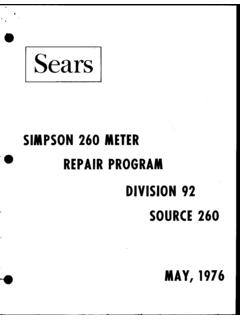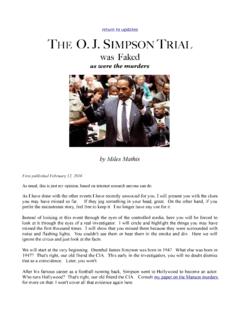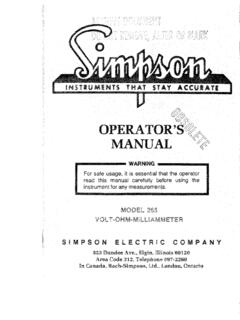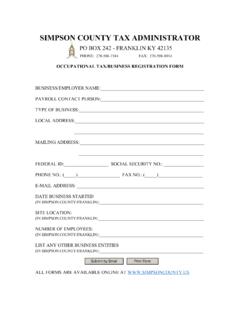Transcription of Breach of Trust Claims - Simpson Wigle LAW LLP
1 Breach of Trust Claims Breach of Trust Claims are often overlooked by contractors and their lawyers. A Breach of Trust claim has several advantages over a Breach of contract claim and even a lien claim . A Breach of Trust claim often allows you to sue an individual, rather than a company which may be insolvent. A Breach of Trust claim gives you the status of a secured creditor, should the defendant go bankrupt. By proving a Breach of Trust , you also have rights to trace the Trust funds into other property that was purchased with Trust funds.
2 You also have more time to bring a Breach of Trust claim than the many short deadlines present in lien Claims . Copyright 2000: Derek A. Schmuck, Simpson Wigle LLP 2 In recent years the courts have broadly interpreted the Trust provisions in the Act. As an example, in Structural Contractors Ltd. v. West Cola Holdings Inc. (2000) 48 (3d) 417 ( ), the Ontario Court of Appeal dealt with renovations to an underground parking garage of a commercial building. The Court held that the rents received by the owner of the building were Trust funds under Sections 7 (3) and 7 (4) of the Act.
3 It was no defence that the rent money was used to pay the operating expenses of the building. The Court stated that the Trust obligation was not limited to the profit component of the rental payments. Other cases have held that contractors are not entitled to pay overhead from Trust funds at the expense of subcontractors (Section 8 of the Act). The Court of Appeal also held the sole officer and controlling mind of the corporate owner, personally liable. His evidence was that he was not aware that the rent payments received by his company might be viewed as Trust funds or that the payment of overhead expenses could constitute a Breach of Trust .
4 The Court of Appeal indicated that the test is an objective one and as the sole officer, director, controlling mind and person Copyright 2000: Derek A. Schmuck, Simpson Wigle LLP 3who signed all the cheques ought to have known the payments of overhead expenses amounted to a Breach of Trust . Some contractors have tried to stretch the Trust provisions even further. One example is the case of Elmford Construction Company Ltd. v. South Winston Properties Inc. (1999) 45 3rd (588) a decision of Justice Dunnet of the Superior Court of Justice.
5 In that case, the contractor brought a Breach of Trust claim against the Town of Oakville and the Bank of Nova Scotia. The developer South Winston Properties had defaulted in its obligations under a subdivision agreement and the Town of Oakville drew on a letter of credit to pay contractors to complete work on the project. There were further funds that remained to be drawn upon. As well, the bank had realized on its security in the property after the developer defaulted and its obligation is to the bank.
6 In any Breach of Trust claim , the recent decision of the Supreme Court of Canada in Soulos v. Korkontzilas (1997) 32 (3rd) 716 should be considered. That case expanded the notion of constructive trusts by holding that a constructive Trust may be imposed where there has been a Breach of a fiduciary obligation, even if the defendant was not enriched by his Breach of duty. Copyright 2000: Derek A. Schmuck, Simpson Wigle LLP 4 Trust Claims The Trust provisions are found in part two of the Act.
7 1. The Trust claim is an additional remedy to the lien on the land and the charge on the holdbacks. A trade can rely on his Trust Claims and his lien claim and pursue them both. The only limit obviously is that one can recover no more than what one is owed. 1. When does the Trust remedy arise? The Trust provisions do not apply if the project does not come within the definition of "improvement" as defined in the Construction Lien Act. For example, the supply of portable school rooms, machinery in a factory that is not permanently affixed to the building or to the Crown or a municipality as owner.
8 See section 7(1). But in a project where the Crown or municipality is the owner, the general contractor and subcontractor still have Trust obligations. As well, if the Crown of Copyright 2000: Derek A. Schmuck, Simpson Wigle LLP 5municipality sells the land, it has the usual Trust obligation under section 9. Some cases however, have been very liberal and allowed a supplier of materials, who supplies on credit in the usual course of business, and to its customers' premises rather than to the site, and without a specific project in mind, still has a Trust claim .
9 A trade can rely on his Trust claim and his lien claim and pursue them both. The only limit obviously is that one can only recover no more than what one is owed. See for example Maple Leaf Homes vs. Zoellner Windows, Steeplejack Services Ltd. vs. Stow Nut & Bolt Co. and re Richmond Brothers Insulation Inc. for examples where a supplier was entitled to the Trust remedy even when he did not know the improvement to which his materials were intended or were used. As another example, even though an architect was not until recently, entitled to the benefit of a lien, they were entitled to Trust rights, at least as long as they supply services to an improvement.
10 Also, the Trust obligations will apply to contractors and subcontractors even where the owner is exempt from the Construction Lien Act - for example where improvement is made on an Indian reserve, a railway, highway, etc. 2. There are several Trust funds or Trust Claims on each project. - Sections 7, 8 and 9 Copyright 2000: Derek A. Schmuck, Simpson Wigle LLP 6 Each Trust obligation imposed by the Act creates a separate Trust that arises and exists independently of the others.










